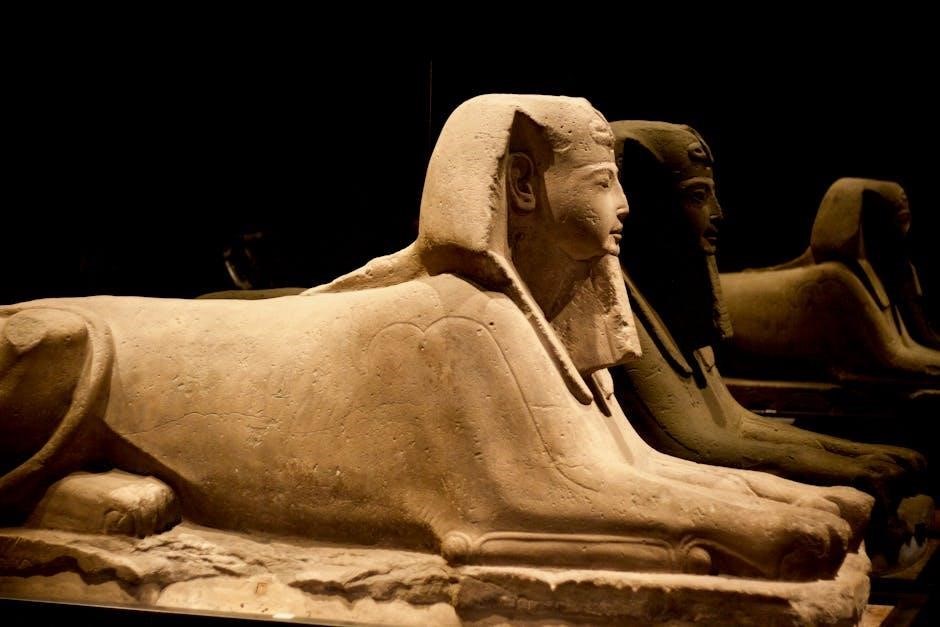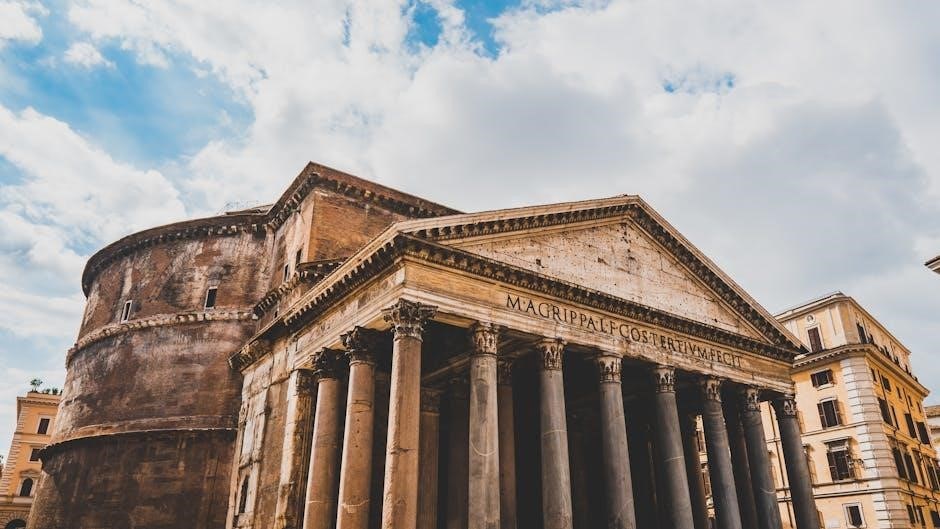Historiography‚ the study of historical writing‚ examines how history is recorded and interpreted. It explores methodologies‚ sources‚ and perspectives‚ shaping our understanding of the past.
1.1 Definition and Scope of Historiography
Historiography is the study of how history is written‚ analyzed‚ and interpreted. It examines the methodologies‚ theories‚ and perspectives historians use to construct narratives about the past. The scope of historiography extends beyond mere fact-gathering‚ delving into the cultural‚ social‚ and political contexts that shape historical accounts. It also explores how interpretations evolve over time‚ reflecting changing values and priorities. By analyzing these elements‚ historiography provides insights into the nature of historical knowledge and its limitations‚ offering a deeper understanding of how the past is represented and understood in different eras and societies.
1;2 Importance of Studying Historiography
Studying historiography is crucial for understanding the evolution of historical thought and the methods behind historical narratives. It reveals how different perspectives and biases influence interpretations of the past‚ fostering critical thinking. By examining various approaches‚ historians can develop a nuanced view of historical events and their representations. This discipline also underscores the importance of context‚ helping to avoid misinterpretations and promoting a more informed understanding of history. Ultimately‚ historiography enhances our ability to engage with the past critically and appreciate the complexities of historical knowledge.
1.3 Key Concepts in Understanding Historiography
Central to historiography are concepts like objectivity‚ subjectivity‚ and narrative structure. Historians analyze primary sources‚ assess evidence‚ and interpret data. The role of bias and context is critical‚ as they shape historical accounts. Additionally‚ understanding theoretical frameworks such as positivism‚ Marxism‚ and postcolonialism provides deeper insights. The distinction between history as events and historiography as their interpretation is vital. These concepts collectively help scholars evaluate historical narratives‚ recognize their limitations‚ and construct balanced perspectives‚ ensuring a comprehensive understanding of the past and its representation.

History vs. Historiography
History refers to past events‚ while historiography studies how these events are documented and interpreted‚ emphasizing methodologies and perspectives in historical analysis.
2.1 Distinction Between History and Historiography
History refers to the events of the past‚ while historiography is the study of how these events are recorded‚ interpreted‚ and presented. History focuses on facts and occurrences‚ whereas historiography examines the methodologies‚ biases‚ and perspectives of historians in shaping historical narratives. It is the analysis of how history is written‚ emphasizing the role of sources‚ context‚ and interpretation. This distinction highlights that history is the subject‚ while historiography is the critical reflection on its representation and evolution over time.
2.2 The Role of Subjectivity in Historical Accounts
Subjectivity plays a significant role in historical accounts‚ as historians’ perspectives‚ biases‚ and interpretations shape their narratives. While history aims to represent past events‚ the selection and emphasis of facts are influenced by the historian’s viewpoint. Different historians interpreting the same events may produce divergent accounts‚ reflecting their own cultural‚ social‚ or ideological contexts. This subjectivity underscores the importance of understanding the historian’s background and the era in which they write. Recognizing these influences helps readers critically evaluate historical narratives and appreciate their complexity. Subjectivity‚ thus‚ is an inherent and unavoidable aspect of historical storytelling.
2.3 How Historians Interpret the Past
Historians interpret the past through diverse methodologies and theoretical frameworks‚ shaping their understanding of historical events. They analyze primary sources‚ such as documents and artifacts‚ to reconstruct narratives. Interpretations vary based on perspectives like Marxist‚ feminist‚ or postcolonial lenses‚ each emphasizing different aspects of history. Contextualization is crucial‚ as historians situate events within broader social‚ political‚ and cultural contexts. Additionally‚ historians consider the evolution of historiography itself‚ acknowledging how past interpretations have influenced contemporary views. This dynamic process reflects the ongoing dialogue between evidence and perspective‚ continually refining our comprehension of historical phenomena and their relevance today.

Major Approaches to Historiography
Major approaches to historiography include empirical‚ deconstructionist‚ Marxist‚ feminist‚ and postcolonial methodologies‚ each offering distinct lenses to analyze and interpret historical narratives and sources.
3.1 Empirical Historiography
Empirical historiography emphasizes the use of verifiable evidence and primary sources to construct historical narratives. It relies on factual data‚ minimizing subjectivity‚ and seeks objectivity through rigorous analysis. This approach focuses on events‚ dates‚ and verifiable phenomena‚ often criticized for being overly positivist; Empirical methods form the foundation of traditional historical research‚ ensuring reliability and accuracy. Historians employing this approach prioritize archival materials and eyewitness accounts‚ aiming to reconstruct the past as it occurred‚ without imposing contemporary interpretations. It remains a cornerstone in the discipline‚ though it has evolved to incorporate interdisciplinary perspectives.
3.2 Deconstructionist Approaches

Deconstructionist historiography challenges traditional notions of objectivity by analyzing the rhetorical and ideological structures within historical narratives. Inspired by theorists like Michel Foucault and Hayden White‚ this approach questions the authority of historical texts‚ revealing how language and power shape interpretations. Deconstructionists argue that histories are constructed narratives rather than objective truths‚ emphasizing the subjective nature of historical accounts. By uncovering underlying biases and assumptions‚ this method critiques dominant discourses and seeks to destabilize fixed meanings‚ offering alternative perspectives on the past. It encourages historians to reflect on their own roles in shaping historical knowledge.
3.3 Marxist Historiography
Marxist historiography emphasizes class struggle and material conditions as primary forces shaping historical events. It critiques capitalism and highlights the role of economics in societal development. Influenced by Marxist theory‚ historians like Eric Hobsbawm explore how economic systems and class relations define historical narratives. This approach often challenges dominant perspectives‚ advocating for a history “from below” that prioritizes the experiences of laborers and marginalized groups. By focusing on structural inequalities‚ Marxist historiography provides a critical lens to understand power dynamics and social change‚ offering a distinct framework for interpreting the past and its impact on contemporary societies.
3.4 Feminist Historiography
Feminist historiography challenges traditional narratives by emphasizing gender as a critical category of analysis. It seeks to uncover women’s experiences and roles in history‚ often marginalized in mainstream accounts. This approach critiques patriarchal structures and explores how gender has shaped social‚ political‚ and cultural dynamics. Feminist historians like Gerda Lerner advocate for a more inclusive understanding of the past‚ highlighting the intersections of gender with race‚ class‚ and sexuality. By reinterpreting historical sources and methodologies‚ feminist historiography aims to correct biases and provide a more comprehensive view of human history‚ fostering a deeper understanding of diverse perspectives and experiences.
3.5 Postcolonial Historiography
Postcolonial historiography critiques the dominant narratives shaped by colonialism‚ emphasizing the voices and experiences of marginalized communities. It challenges Eurocentric perspectives and explores the impact of colonialism on indigenous cultures‚ economies‚ and societies. This approach highlights the agency of subaltern groups and reinterprets historical events from their viewpoint. Influenced by theorists like Edward Said and Gayatri Spivak‚ postcolonial historiography seeks to decolonize history‚ uncover silenced histories‚ and promote a more inclusive understanding of global experiences. By questioning power structures‚ it offers a nuanced and equitable perspective on the past‚ fostering a deeper understanding of cultural and political dynamics shaped by colonial legacies.

Regional Historiographies
Regional historiographies explore historical writing within specific geographic and cultural contexts‚ such as Europe‚ Africa‚ Asia‚ and the Middle East‚ emphasizing unique methodologies and perspectives.
4.1 European Historiography
European historiography has profoundly shaped global historical thought‚ emphasizing intellectual‚ social‚ and cultural narratives. It often focuses on the evolution of Western civilization‚ political systems‚ and societal transformations. Key themes include the Enlightenment‚ nationalism‚ and colonialism; Historians like Hayden White and Michel Foucault have influenced European historiographical methods‚ stressing the role of narrative and power in historical accounts. The region’s rich archival sources and diverse scholarly traditions have fostered debates on objectivity‚ interpretation‚ and historical memory. European historiography continues to evolve‚ integrating interdisciplinary approaches and reflecting on its colonial and postcolonial legacies.
4.2 African Historiography
African historiography focuses on the study of the continent’s diverse cultures‚ societies‚ and historical experiences. It often emphasizes oral traditions‚ precolonial kingdoms‚ and the impact of colonialism. Historians explore themes like economic systems‚ political structures‚ and social dynamics. African historiography challenges Eurocentric narratives‚ highlighting indigenous perspectives and resilience. Contemporary approaches integrate interdisciplinary methods‚ blending history with anthropology and sociology. The field also addresses the legacy of colonial distortion and the reclaiming of African voices. By examining local histories and broader regional trends‚ African historiography provides a rich understanding of the continent’s complex past and its global significance.
4.3 Asian Historiography
Asian historiography encompasses diverse traditions of historical writing across the continent. It includes ancient texts like Chinese dynastic records and Indian epics‚ which blend history with mythology. Regional approaches vary‚ with East Asian historiography emphasizing imperial chronicles‚ while South Asian traditions often incorporate religious and cultural narratives. Colonialism influenced modern Asian historiography‚ introducing Western methodologies. Today‚ scholars integrate indigenous perspectives with global frameworks‚ exploring themes like imperialism‚ nationalism‚ and cultural identity. Asian historiography highlights the richness of local histories while addressing broader regional and global connections‚ offering nuanced insights into Asia’s complex historical tapestry.
4.4 Middle Eastern Historiography
Middle Eastern historiography reflects the region’s rich cultural and religious heritage. Early Islamic chronicles emphasized religious and political narratives‚ blending history with theology. Ottoman and Persian traditions focused on imperial and dynastic histories. Modern scholarship incorporates Western methodologies while maintaining indigenous perspectives. Themes include colonialism‚ nationalism‚ and identity formation. Contemporary historiography addresses issues like gender‚ social history‚ and transnational connections. The region’s complex past is explored through diverse sources‚ from Arabic manuscripts to oral traditions‚ offering a multifaceted understanding of its historical evolution and cultural significance in global contexts.

Theoretical Frameworks in Historiography
Theoretical frameworks in historiography provide structured approaches to analyzing and interpreting historical data‚ guiding historians in understanding patterns‚ causes‚ and meanings within the past.
5.1 Positivist Approach
The positivist approach in historiography emphasizes the scientific study of history‚ focusing on objective analysis and empirical evidence. It seeks to uncover facts through rigorous methodologies‚ aiming for neutrality and precision. Positivist historians rely on verifiable data and avoid subjective interpretations‚ believing that historical truths can be discovered through systematic investigation. This approach has been influential in establishing history as a discipline‚ though it has faced criticism for overlooking the role of interpretation and context in historical narratives. Positivism remains a foundational framework in historiographical practices.
5.2 Narrative History
Narrative history focuses on storytelling‚ presenting historical events in a chronological and coherent structure. It often employs literary techniques to engage readers‚ emphasizing causality and human agency. Historians like Hayden White have explored how narrative shapes historical understanding‚ blending fact with interpretation. While narrative history enhances accessibility‚ critics argue it risks oversimplifying complex events. Nonetheless‚ it remains a powerful tool for conveying historical experiences‚ balancing detail with readability and emotional resonance in the study of the past.
5.3 Social History
Social history examines the experiences of ordinary people‚ focusing on social structures‚ culture‚ and daily life. It emerged in the 20th century to broaden historical narratives beyond political events. By studying class‚ gender‚ and race‚ social historians uncover marginalized voices and challenge traditional accounts. Sources like diaries‚ legal records‚ and oral histories provide insights into common people’s lives. This approach humanizes history‚ emphasizing how societal dynamics shape individual experiences. Social history bridges the gap between macro-level events and micro-level realities‚ offering a more inclusive understanding of the past and its impact on contemporary society.
5.4 Cultural History
Cultural history explores the cultural aspects of a society‚ including arts‚ beliefs‚ and practices. It emerged in the 20th century‚ focusing on how culture shapes historical events and identities. By analyzing symbols‚ rituals‚ and cultural expressions‚ historians uncover the values and worldviews of past societies. This approach often intersects with social history‚ emphasizing the lived experiences of people. Influential historians like Jacob Burckhardt have shaped this field‚ highlighting the importance of culture in understanding historical contexts. Cultural history bridges the gap between elite and popular culture‚ offering a nuanced view of how societies construct meaning over time.

Influential Historians and Their Contributions
Hayden White‚ Michel Foucault‚ and Eric Hobsbawm shaped historiography through their innovative approaches‚ exploring narrative structures‚ power dynamics‚ and Marxist interpretations‚ forever altering how history is analyzed and presented.
6.1 Hayden White
Hayden White‚ a prominent philosopher of history‚ revolutionized historiography through his work Metahistory‚ which explored how historians use narrative structures to shape historical accounts. He argued that historical writing is inherently subjective‚ influenced by literary tropes and cultural contexts. White’s critique of positivist historiography emphasized the role of imagination and rhetoric in constructing historical narratives; His ideas challenged traditional notions of objectivity‚ urging historians to acknowledge the creative and interpretive dimensions of their craft. White’s contributions remain central to understanding the theoretical underpinnings of historical writing and its relationship to literature and philosophy.
6.2 Michel Foucault
Michel Foucault‚ a French philosopher and historian‚ significantly influenced historiography through his critical analysis of power‚ knowledge‚ and discourse. His works‚ such as The Order of Things and Discipline and Punish‚ challenged traditional historical narratives by emphasizing the role of power in shaping knowledge and institutions. Foucault introduced concepts like “power-knowledge” and “genealogy‚” which explore how historical accounts are constructed and legitimized. His approach encouraged historians to question dominant discourses and uncover marginalized voices‚ offering a more nuanced understanding of the past. Foucault’s methodologies remain pivotal in contemporary historiographical debates.
6.3 Eric Hobsbawm
Eric Hobsbawm‚ a renowned Marxist historian‚ significantly shaped modern historiography through his extensive writings on social and economic history. His works‚ such as The Age of Revolutions and The Age of Extremes‚ provide a comprehensive analysis of historical transformations. Hobsbawm emphasized the interplay between social movements‚ economic systems‚ and political change‚ offering a global perspective on historical processes. His approach integrated Marxist theory with empirical research‚ influencing scholars to consider class struggle and material conditions in historical narratives. Hobsbawm’s contributions remain central to understanding the dynamics of modernization and globalization.
6.4 Gerda Lerner
Gerda Lerner‚ a trailblazer in feminist historiography‚ revolutionized the study of women’s history. Her seminal work‚ The Creation of Patriarchy‚ explored gender roles and their historical roots. Lerner emphasized the importance of integrating women’s experiences into mainstream historical narratives‚ challenging traditional male-dominated accounts. She also founded the field of women’s history‚ advocating for a more inclusive understanding of the past. Her contributions have profoundly influenced modern historiography‚ encouraging scholars to address gender as a critical category of historical analysis. Lerner’s work remains foundational in reshaping how historians approach the study of gender and society.

Current Trends in Historiography
Current trends in historiography include digital tools‚ interdisciplinary approaches‚ and global perspectives. Historians now incorporate diverse sources and engage with public audiences‚ fostering a more inclusive understanding of history.
7.1 Digital Historiography
Digital historiography leverages technology to transform historical research and presentation. Tools like OCR‚ NLP‚ and digital archives enable efficient analysis of vast records. Computational methods facilitate data visualization and pattern recognition‚ offering new insights. Online platforms foster collaboration‚ allowing historians to share findings globally. Digital media also democratize history‚ making it accessible to broader audiences. However‚ ethical concerns arise regarding data accuracy and interpretation. Despite challenges‚ digital historiography revolutionizes how history is studied and communicated‚ blending tradition with innovation to enhance understanding of the past.
7.2 Global Historiography
Global historiography emphasizes the interconnectedness of historical events across regions and cultures. It challenges Eurocentric narratives by incorporating diverse perspectives from Africa‚ Asia‚ and the Americas. This approach highlights shared human experiences and global phenomena‚ such as trade‚ migration‚ and colonialism. By analyzing historical interactions‚ global historiography fosters a more inclusive understanding of the past. It encourages collaboration among historians worldwide to address imbalances in historical representation. This method bridges regional histories‚ offering a holistic view of global development and its complexities;
7.3 Interdisciplinary Approaches
Interdisciplinary approaches in historiography integrate insights from sociology‚ anthropology‚ and cultural studies. These methods enrich historical analysis by incorporating diverse perspectives. For instance‚ combining history with sociology provides a deeper understanding of social structures and their evolution. Anthropology adds ethnographic insights‚ while cultural studies highlight representations and identities. Such approaches challenge traditional narratives‚ offering a more nuanced view of historical events. By bridging disciplines‚ historians can address complex questions and produce comprehensive interpretations. These methods also foster collaboration‚ leading to innovative research that transcends conventional boundaries and enriches our understanding of the past.
7.4 Public History
Public history engages audiences beyond academia‚ making historical knowledge accessible through museums‚ documentaries‚ and digital platforms. It emphasizes community involvement and education‚ fostering a broader understanding of the past. Historians in this field often collaborate with cultural institutions to create exhibitions‚ programs‚ and media that highlight diverse perspectives. Public history also advocates for historical preservation‚ promoting the relevance of history in contemporary society. By bridging the gap between scholars and the public‚ it ensures that historical narratives remain inclusive and impactful‚ contributing to a shared cultural heritage and collective memory.

Challenges in Historiography
Historiography faces challenges like bias‚ limited sources‚ and evolving interpretations‚ requiring historians to critically assess evidence and methodologies to maintain objectivity and accuracy in historical narratives.
8.1 Bias and Objectivity
Bias and objectivity are central challenges in historiography. Historians often face dilemmas in presenting facts without personal or cultural prejudices‚ as interpretations can be influenced by societal norms or individual perspectives. Achieving complete objectivity is difficult‚ as historical accounts are shaped by the historian’s context and sources. Additionally‚ the selection of evidence can introduce bias‚ either intentionally or unintentionally. Addressing these issues requires critical self-reflection and rigorous methodologies to ensure balanced and accurate historical narratives. Recognizing bias is crucial for maintaining the integrity of historical scholarship and fostering trust in its findings.
8.2 Sources and Evidence
Sources and evidence form the foundation of historiography‚ yet their interpretation poses significant challenges. Historians must evaluate the credibility and reliability of primary and secondary sources‚ considering factors like author bias and context. The availability of evidence often dictates historical narratives‚ with gaps or limited sources leading to incomplete or speculative conclusions. Additionally‚ the authenticity of documents and artifacts must be verified to ensure accurate analysis. The careful selection and critical assessment of sources are essential for constructing reliable historical accounts‚ as flawed evidence can mislead interpretations and distort historical truths.
8.3 Historical Revisionism
Historical revisionism involves reinterpreting established historical narratives‚ often challenging prevailing views. It emerges from new evidence‚ shifting perspectives‚ or ideological changes. Revisionism sparks debate‚ as it questions traditional interpretations and may alter understanding of past events. Critics argue it risks distorting history‚ while proponents see it as a necessary correction of biases or omissions. Revisionist approaches encourage a deeper examination of sources and contexts‚ fostering a more nuanced understanding of history. However‚ it must be grounded in credible evidence to avoid misrepresentation and maintain historical integrity.
8.4 Ethical Considerations
Ethical considerations in historiography involve the moral obligations of historians to present accurate and unbiased accounts. Issues like objectivity‚ source credibility‚ and representation are critical. Historians must avoid imposing modern values on past events and be transparent about their methodologies. Misrepresentation or omission of facts can perpetuate injustices or distort understanding. Ethical historiography demands a commitment to truth‚ respect for diverse perspectives‚ and accountability for the impact of their work on society and memory. These principles ensure that historical narratives remain trustworthy and contribute positively to public knowledge and discourse.

The Future of Historiography
The future of historiography lies in embracing digital tools‚ global perspectives‚ and interdisciplinary approaches. It will focus on diversifying narratives and engaging public audiences more effectively.
9.1 Technological Advancements
Technological advancements are revolutionizing historiography by enabling new methods of data analysis and interpretation. Digital tools‚ such as machine learning and big data analytics‚ allow historians to process vast amounts of historical information efficiently. Online archives and digital repositories provide unprecedented access to primary sources‚ fostering global collaboration among researchers. Additionally‚ virtual reality and interactive platforms are transforming how historical narratives are presented‚ making history more accessible and engaging for diverse audiences. These innovations are reshaping the field‚ offering fresh insights and expanding the scope of historical inquiry.
9.2 Expanding Historical Narratives
Expanding historical narratives involves incorporating diverse voices and perspectives to create a more comprehensive understanding of the past. Historiography now emphasizes inclusivity‚ addressing marginalized groups and non-Western experiences. Digital archives and interdisciplinary approaches enable historians to uncover overlooked histories‚ fostering a richer‚ globalized view of historical events. This shift challenges traditional Eurocentric narratives‚ promoting a broader context for historical analysis. By integrating diverse sources and methodologies‚ historiography continues to evolve‚ offering deeper insights into the complexities of human history and its relevance to contemporary society.
9.3 Collaborative Research
Collaborative research in historiography fosters innovation by bringing together diverse scholars and disciplines. Digital platforms and shared archives enable historians to work across borders‚ combining expertise and resources. This approach encourages interdisciplinary perspectives‚ enriching historical interpretations. Collaborative projects often address global themes‚ such as postcolonial histories or environmental studies‚ providing a more holistic understanding. By pooling knowledge‚ historians can challenge traditional narratives and develop new methodologies. Such teamwork not only enhances the accuracy of historical accounts but also promotes a more inclusive and dynamic field‚ reflecting the interconnected nature of modern scholarship and its relevance to global challenges.
9.4 Engaging the Public
Engaging the public in historiography involves making historical research accessible and relatable through various mediums. Digital platforms‚ such as interactive websites and social media‚ play a crucial role in sharing historical insights with broader audiences. Public history initiatives‚ including museum exhibitions and community projects‚ foster a deeper connection between historians and the general public. By sharing diverse perspectives and encouraging participation‚ historians can demystify their work and highlight its relevance to contemporary issues. This engagement not only educates but also empowers individuals to understand and appreciate the complexities of the past‚ fostering a more informed and historically conscious society.
Historiography evolves‚ reflecting changing methodologies and perspectives. It bridges past and present‚ shaping future interpretations. Historians illuminate the past‚ guiding us toward a more informed future.
10.1 Recap of Key Points
Historiography‚ the study of historical writing‚ explores how historians interpret and present the past. It examines methodologies‚ biases‚ and evolving perspectives‚ emphasizing the subjective nature of historical narratives. Key concepts include the distinction between history and historiography‚ the role of evidence‚ and the influence of cultural and ideological frameworks. Historians continually revise and reinterpret the past‚ reflecting changing societal values and technological advancements. By analyzing these elements‚ historiography provides insights into how our understanding of history is shaped and reshaped over time‚ ensuring a dynamic and adaptive field of study.
10.2 The Evolving Nature of Historiography
Historiography is a dynamic field that continually evolves‚ reflecting shifts in societal values‚ technological advancements‚ and intellectual frameworks. Traditional approaches have given way to interdisciplinary methods‚ incorporating insights from sociology‚ anthropology‚ and cultural studies. The rise of digital tools has expanded access to historical sources‚ enabling new interpretations and collaborative research. As global perspectives gain prominence‚ historiography becomes more inclusive‚ challenging Eurocentric narratives and incorporating diverse voices. This evolution ensures that historical understanding remains relevant‚ adapting to contemporary questions and fostering a deeper engagement with the past.
10.3 The Role of Historians in Shaping Understanding
Historians play a crucial role in shaping our understanding of the past by interpreting historical events and sources. Their work is not merely factual recording but involves subjective analysis‚ ethical considerations‚ and contextual framing. Historians synthesize evidence‚ challenge prevailing narratives‚ and offer new perspectives‚ influencing collective memory and cultural identity. By engaging with diverse methodologies and interdisciplinary approaches‚ they ensure that historical knowledge evolves‚ reflecting contemporary values and questions. Their interpretations shape public perception‚ fostering a deeper understanding of historical complexities and their relevance to the present.


